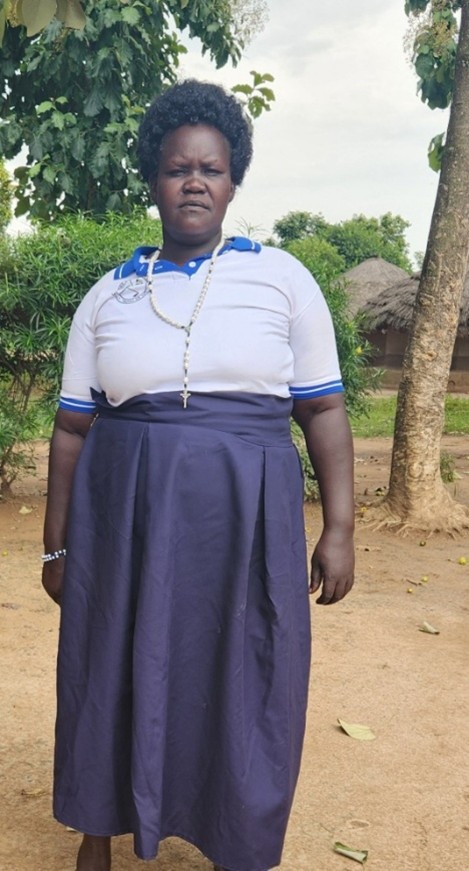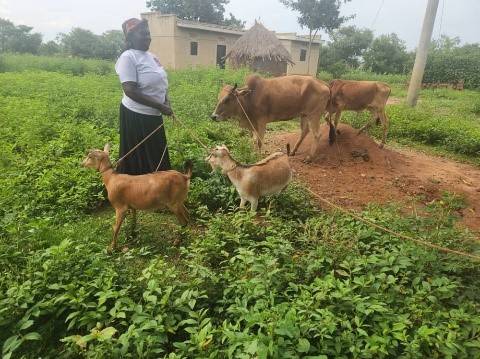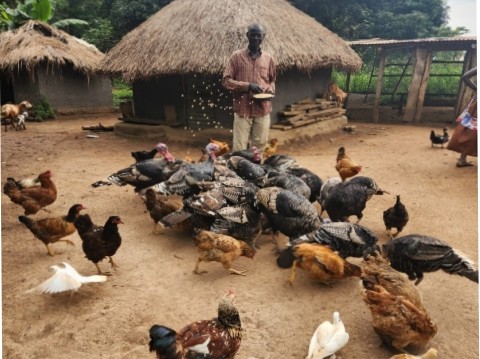By Aboth Matilda
In a small village in Adwoa Parish, Lira District, the lives of three people demonstrate how supporting women and marginalized groups in farming can transform entire communities. For years, women here have been responsible for feeding their families, but they often lack the money, tools and support they need to do this well. Men also struggle, often taking on difficult temporary jobs to make ends meet.
The CASCADE project implemented by the Africa Innovation Institute in the district, focused intentionally on supporting the “last mile woman”, the women who work tirelessly to feed their families but receive the least help. This gender-sensitive approach is helping shift long-standing power dynamics.
Awor Madoline used to be like many women farmers in her area, working hard but barely surviving. She farmed sunflowers using only hand tools and poor-quality seeds, which only gave her 400 kilograms per acre. This wasn’t enough to support her family and she felt trapped in a cycle of poverty.

Awor Madoline CBF of AFRII- CASCADE in Adwoa parish, Ogur sub/county, Lira District.
Then CASCADE came to her community and chose her for training to become a community leader. This was unusual because in her culture, men usually take leadership roles in farming. But CASCADE challenged this norm, recognising that women’s lived experiences with food insecurity positioned them as powerful agents of change. They believed that women could be equally, if not more effective leaders, precisely because they intimately understand the daily struggles of feeding and sustaining their families.
Through the training, Madoline learned better farming methods. She discovered how to use improved seeds, better tools and proper farming techniques. The results were amazing; her sunflower harvest doubled to 800 kilograms per acre. This success changed everything for her family and gave her confidence to help others.
In addition to boosting her yields, Madoline also learned the importance of growing and preparing nutritious food for her household. With guidance from CASCADE, she began incorporating more diverse and nutrient-rich crops into her family’s meals, including vegetables and legumes. This shift significantly improved the health and well-being of her children, who previously suffered from frequent bouts of malnutrition. “I moved from hand hoes to ox plough. From selling poor quality seeds to quality seeds. That is transformation,” Madoline says. But her transformation wasn’t just about farming tools it was about becoming a leader in a community where women rarely held such positions.
CASCADE then trained Madoline to become a community-based facilitator, putting her in charge of helping 250 other farmers in her area. This was a big responsibility, but Madoline was ready. She had experienced the struggles herself and knew exactly what other farmers needed. Her role became a vehicle for empowering others, especially vulnerable women, who often face multiple layers of exclusion.
Among the farmers Madoline trained was 58-year-old Acio Milly, a mother of 14 children. Despite having land to farm, she couldn’t afford good seeds, organic fertilizer or proper tools. Every season was a struggle just to grow enough food to keep her large family from going hungry.
“I had land, but with limited resources to cultivate it properly,” Milly remembers. “Every season was a struggle just to survive. Like many women in her community, Milly carried the heavy responsibility of feeding her family but lacked access to loans or credit to improve her farming. She, like countless other rural women, had no access to formal financial services often excluded due to lack of collateral such as land or property, which is typically owned or controlled by men.
Madoline recognized that Milly was one of the most vulnerable people in their community. In 2024, she helped Milly join a local savings group connected to the government’s Parish Development Model program. This was crucial because women like Milly usually can’t get loans from banks, as they often lack property to use as security, and banks often don’t take women farmers seriously.
Through this program, Milly received 1 million Ugandan shillings (USD 270) as an affordable loan. But more importantly, she received training on how to use this money wisely. CASCADE’s approach isn’t just about receiving money; it is about equipping people especially marginalized groups with the knowledge to manage it effectively. This support included financial literacy and enterprise management, empowering them to make sound and sustainable business decisions.

Milly taking her animals to graze.
Milly made very clever choices with her loan. She used 400,000 shillings to rent better land and buy improved maize seeds and organic fertilizer. Another 400,000 shillings was spent on purchasing a heifer and she used the remaining 200,000 shillings to acquire breeding goats.
With training on family nutrition under CASCADE, Milly also prioritized food security at home. She began using part of her maize harvest for home consumption, ensuring her children had daily access to healthy meals. The milk from her heifer added a vital protein source to their diet, contributing to a noticeable improvement in their energy and health.
The results were incredible. Within four months, Milly harvested 35 bags of maize – far more than she had ever grown before. She sold 15 bags to make money and used the profits to buy more goats. Her livestock also began producing milk and giving birth, creating even more income.
“Before PDM, I had land but with limited resources to cultivate it. Now I have seeds, animals and hope. I am no longer a beggar, I am an inspiration to the community,” Milly says proudly. Her transformation reflects the economic and social empowerment of rural women when given the tools, trust, and training.
The program also supported men in the community, like 59-year-old Yuventino Odongo, a father of six. For years, Yuventino had struggled to support his family through small-scale farming and casual labour taking on any temporary work he could find, like construction or farm work for other people.
This kind of work is tough and unreliable. Some days there would be work, other days there wouldn’t be. The pay was low and it was physically demanding. Yuventino wanted something better for his family but didn’t know how to break out of this cycle.
When Madoline identified Yuventino as someone who could benefit from the program, she helped him join the same savings group as Milly. He also received a 1-million-shilling loan and training on how to use it effectively. While the primary aim was empowering women, inclusive support ensured shared prosperity and balanced household decision-making.
Yuventino decided to focus on poultry farming raising chickens and turkeys. He used his loan to buy young birds, build proper shelters for them and purchase vaccines and feed to keep them healthy.
Within six months, Yuventino’s turkey flock had grown to over 24 birds. During peak seasons, he could sell mature turkeys for 90,000 to 120,000 shillings each (about $25-33). His chicken business also grew to over 30 birds, giving him a steady income from selling eggs and chickens.

Yuvention feeding his birds.
“I used to admire poultry farmers from a distance. With PDM, I became one and even better, I now train others. I believe poverty can be defeated if we use opportunities well,” Yuventino explains. His success allowed him to stop doing casual labour and focus on his farming business. He even began teaching other men in the community how to raise poultry.
This story from Adwoa Parish represents one of many similar transformations occurring across CASCADE’s implementation areas. By linking 1,404 farmers to government programs across Acholi and Tooro regions, CASCADE demonstrates how community-based facilitation creates sustainable pathways out of poverty while strengthening local institutional capacity.
As CASCADE continues to strengthen its impact, this story from Adwoa Parish serves as powerful evidence that community-based facilitation, strategic government partnerships and targeted investments in women’s agricultural leadership can break the cycles of poverty and create lasting pathways to prosperity for rural communities in Northern Uganda. It reaffirms that investing in women’s leadership, inclusive training, and equitable access to resources is not only fair, it is transformative.
The Author is the Agronomy Officer at AfrII



